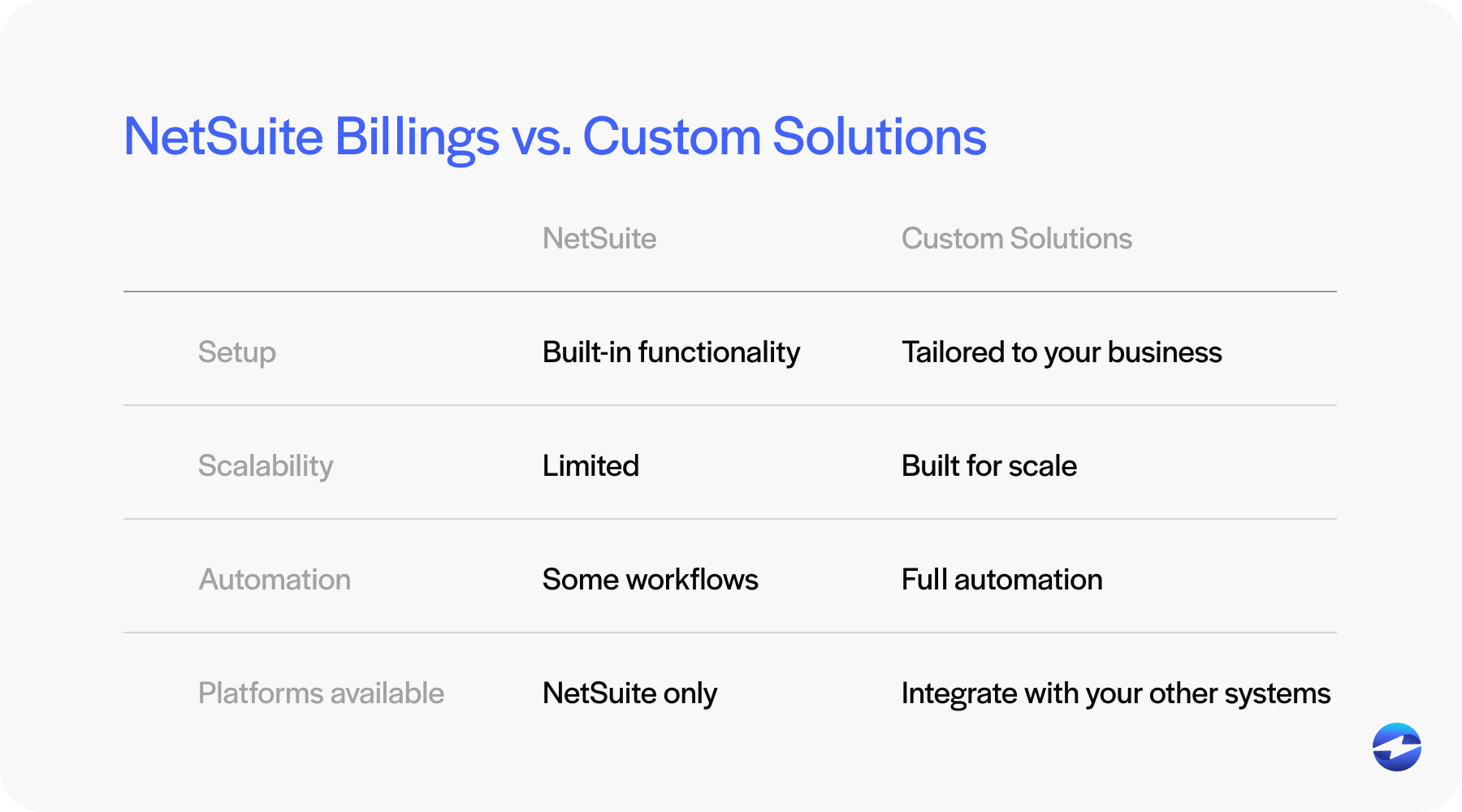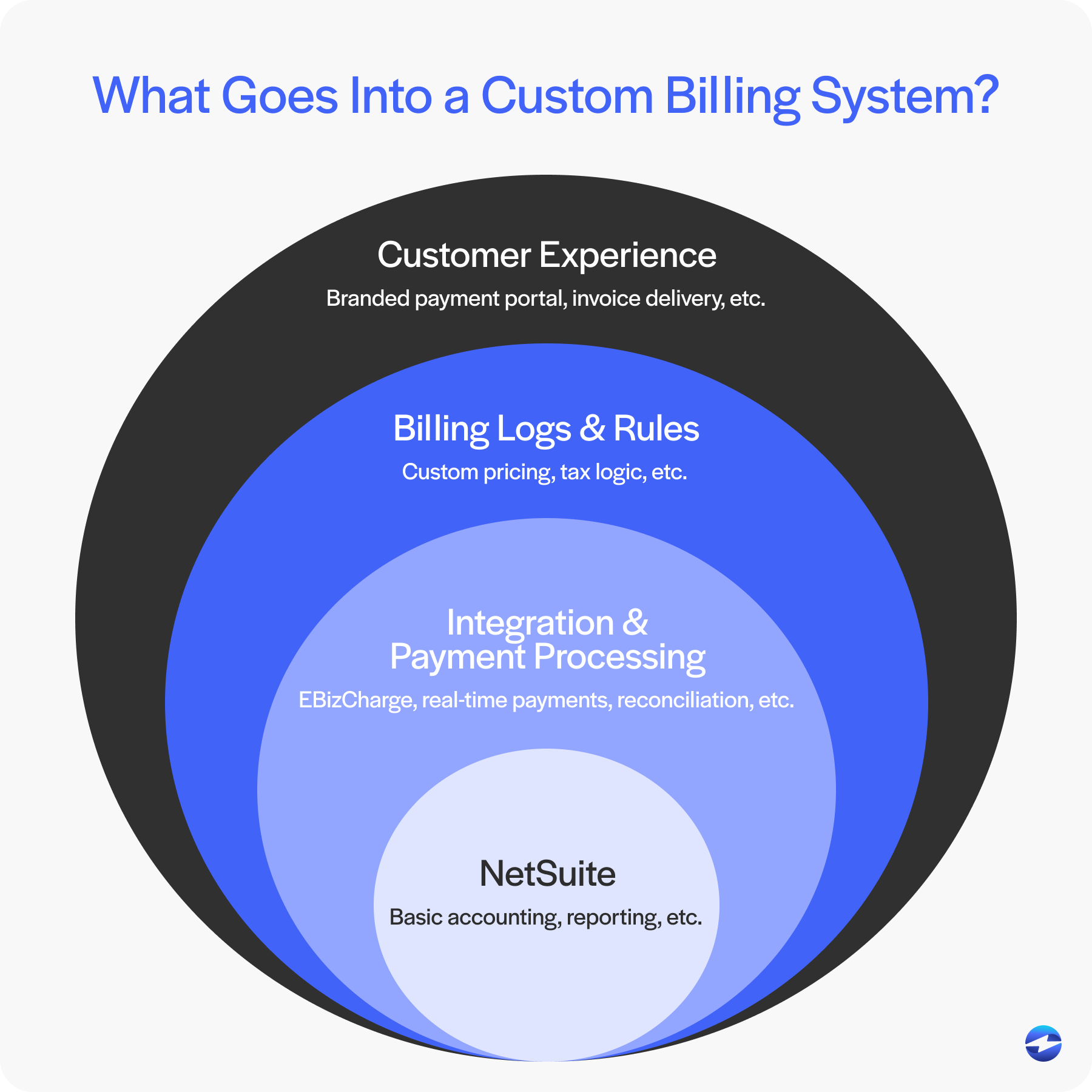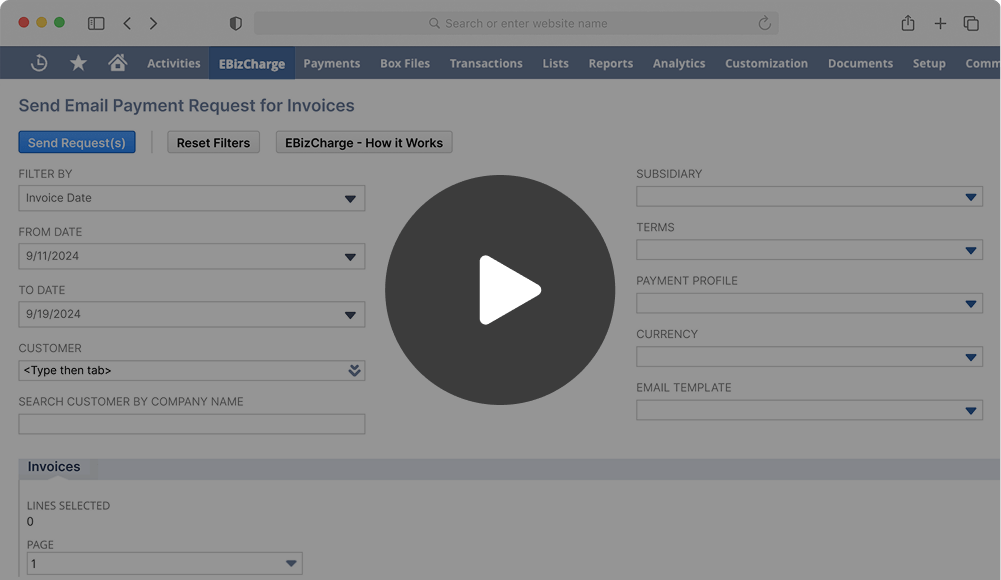Blog > When to Consider Custom Billing Solutions for NetSuite
When to Consider Custom Billing Solutions for NetSuite
Billing can either be a strategic advantage or a slow, frustrating bottleneck. For many businesses running on NetSuite, the out-of-the-box billing features are a great place to start. The NetSuite billing module covers essential functions like subscription billing, usage-based pricing, and milestone billing. But as your business grows in complexity, those tools may start to feel limiting.
That’s where custom billing solutions come in. This article will help you determine when to consider something beyond the standard toolkit. If you’re a NetSuite user trying to streamline your operations or better serve a nuanced business model, this guide is for you.
Understanding NetSuite billing limitations
NetSuite billing solutions offer a solid foundation. You can handle recurring payments, project milestones, and basic usage tracking. The native functionality within the NetSuite billing module is ideal for many businesses in the early stages of growth or for those with straightforward billing operations. It covers a wide array of core billing functions, and when paired with a payment processor or third-party integration, it can extend further.

But as your billing needs become more complex—whether due to growth, diversification, or shifting industry expectations—those built-in tools may not keep up. Businesses with unique billing logic, industry-specific workflows, or high transaction volumes often need more flexibility and control than what’s available out of the box.
Here are some common challenges:
- Inflexible billing schedules that don’t fit your customer agreements or operational cycles
- Limited support for advanced or dynamic pricing structures, like discounts that change based on usage or term length
- Trouble managing multiple products, services, or revenue streams under one roof, especially if each has distinct billing logic
- Difficulties syncing billing data with external systems or platforms like customer relationship management (CRMs), eCommerce solutions, or a payment processing solution.
In short, the NetSuite billing module is powerful, but not always adaptable without some heavy lifting. That’s where NetSuite custom billing solutions often come into play—giving teams the freedom to tailor billing to their exact business model while maintaining tight control over payment processing and financial reporting.
Signs you may need a custom billing solution
There comes a point in the growth of any business when basic tools stop being enough. For companies relying on the NetSuite billing module, that moment often arises when standard functionality creates more work than it saves. If your billing process feels increasingly like a patchwork of workarounds or your team spends more time fixing errors than analyzing trends, it could be time to reconsider your approach.
There are a few red flags that suggest it’s time to look at NetSuite custom billing solutions:
- Complex Pricing Structures: If you’re offering tiered pricing, volume discounts, or packages that mix products and services, you might hit the ceiling of what NetSuite billing can handle natively. A custom approach can allow you to build billing logic that matches your actual sales strategy.
- High Volume of Billing Transactions: Manual billing and reconciliation become unsustainable at scale. If your billing team is drowning in spreadsheets or errors creeping in, it’s time to automate. Custom NetSuite billing solutions can help you automate invoicing, reduce manual entry, and improve accuracy.
- Multi-Entity or Global Operations: Expanding internationally? Managing multiple subsidiaries? That adds layers of complexity—think currency conversions, tax rules, and localized invoicing. A custom billing solution can help align your NetSuite instance with regional needs.
- Integration with External Platforms: Real-time data flow between systems is crucial. Whether syncing with your CRM, eCommerce platform, or a third-party integration, a custom billing solution can bridge the gaps.
- Custom Revenue Recognition Needs: If your accounting team deals with complex revenue timing, custom automation can make your reporting cleaner and more compliant.
If these scenarios are becoming part of your day-to-day reality, it may be time to take a closer look at how well your billing systems are really serving you. Investing in NetSuite custom billing solutions isn’t about bells and whistles—it’s about building a foundation that supports sustainable, error-free growth as your business model evolves.
Benefits of a custom billing solution for NetSuite
Investing in a custom billing solution isn’t just about fixing problems—it’s about unlocking capabilities that standard systems weren’t built to handle. When your billing system can flex to meet the real-world needs of your business, you’re not just improving operations—you’re building a foundation for smarter growth and smoother collaboration between teams.
When done right, a custom solution becomes an extension of your team. Here’s what you can expect:
- Billing processes tailored to your exact business model
- Fewer manual tasks
- Faster invoice cycles
- Cleaner, real-time reporting with fewer errors
- Scalability to support new product lines, business units, or acquisitions
And if you tie your billing logic to a payment processing solution, you can speed up cash flow, too.
Custom billing also gives your business more control. You can adapt to market changes faster, support new offerings without reengineering your systems, and reduce dependency on rigid software constraints. The benefits go beyond finance—sales, customer service, and leadership all gain better visibility and stronger tools to support the customer journey.
Questions to ask before investing in custom billing
Deciding whether or not to invest in a custom billing solution can involve significant time, cost, and collaboration across teams, so the decision shouldn’t be made lightly. Before jumping into a full-scale implementation, it’s important to assess whether the benefits of custom billing truly align with your business needs and goals.
Before diving in, pause and evaluate:
- What are the current bottlenecks in our billing cycle?
- How much time is the finance team spending on manual fixes?
- Are we losing money due to credit card processing errors or late invoicing?
- What’s the real return on investment if we move to a custom setup?
Answering these will help you make a case and avoid over-engineering a solution. A thoughtful evaluation at this stage can save your team time, budget, and unnecessary frustration down the road. It also helps ensure that the path you choose – whether custom, hybrid, or native – matches the specific realities of how your business operates today and where it’s headed tomorrow.
Custom billing implementation considerations
Implementing custom billing solutions within NetSuite involves rethinking how billing operations are structured, coordinated, and maintained across departments. The goal isn’t just technical—it’s to design a process that supports how your business works, now and in the future.
Rolling out NetSuite custom billing solutions isn’t just about writing code. You need to:
- Work with experienced NetSuite consultants or developers who understand your industry
- Estimate timelines and costs realistically
- Plan for data migration, validation, and testing
- Align your new billing logic with your payment processor
- Train your finance and operations teams on the new flow

This process often requires cross-functional collaboration, as billing touches everything from accounting to customer service. It’s important to map out how information will flow through each part of the system and identify where automation can reduce errors and save time. Testing is also essential—not just for functionality, but for compliance, reporting accuracy, and customer experience as well.
Done well, a custom implementation doesn’t just support your billing needs—it enables your team to work smarter, adapt faster, and scale confidently.
How EBizCharge transforms NetSuite billing
Billing is more than just a back-office task—it impacts the entire customer journey, from sales to retention. And as your business grows, the need for a billing system that’s both flexible and deeply integrated becomes more urgent. That’s where EBizCharge comes in.
EBizCharge provides a seamless NetSuite integration designed specifically to streamline payment operations. By embedding directly into your NetSuite environment, EBizCharge allows you to process credit card and ACH payments within the same system you use to manage invoicing, accounting, and customer data. This eliminates the need to jump between systems, reduces errors, and accelerates cash flow.
Beyond simplifying credit card processing, EBizCharge enhances the entire billing workflow with real-time payment posting, automated reconciliation, and customizable reporting. The result is a more efficient, secure, and transparent payment experience, for both your internal teams and your customers.
So, if you’re feeling constrained by your current billing setup, look at how integrated tools like EBizCharge can fill the gap. With the right solution, you can turn billing from a source of frustration into a driver of efficiency and growth.

